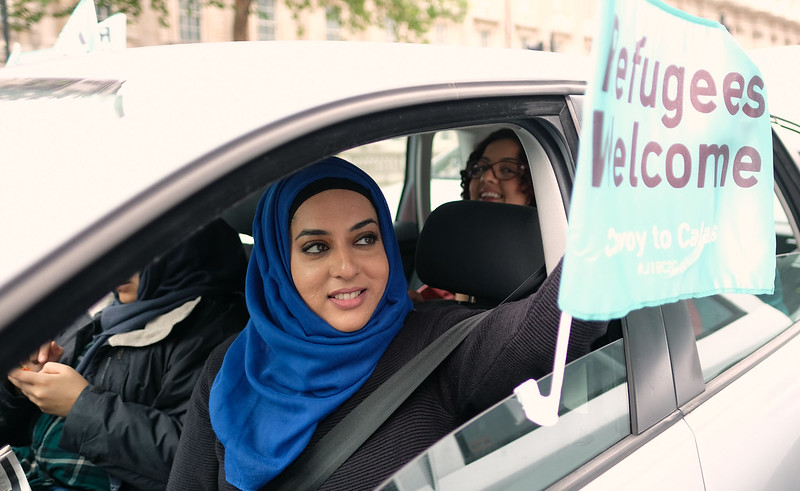Photo by Alisdare Hickson, flickr
By Leonie Ngom
In the shadow of the English Channel, the port city of Calais has come to symbolise both hope and despair for migrants seeking refuge in the United Kingdom. Over the years, Calais has seen a constant flow of individuals fleeing conflict, persecution and poverty, with aspirations of starting a new life across the sea. However, instead of being a symbol of compassion and solidarity, it has transformed into a battleground where the rights of migrants and their advocates are consistently undermined. For several decades, migrants, mainly from Sudan, Eritrea, Syria, Iraq and Afghanistan, have been in Calais, in Northern France, with the hopes of reaching the United Kingdom, for various reasons, including rebuilding their life there, having connections, speaking English, or believing that claiming asylum is more likely to be successful there.
Several camps have been built over the years since the first one was established in 1999 by the Red Cross, to provide a living space for migrants and offer help. The largest one, known as the ‘Jungle’, housed 6500 people and was demolished in 2016. Despite the presence or the absence of formal camps, and the strategies of local authorities to discourage the building of new camps, migrants continue to gather in the North of France, with the persistent hope of crossing the Channel to reach the UK.
Yet, a recent press release by Médecins Sans Frontières (MSF) on 5th April 2024 sheds light on the dire situation faced by migrants in Calais. MSF especially deplores how many families and non-accompanied minors have not been provided with accommodation by the French government, despite the difficult conditions exacerbated by the winter. Despite their urgent need for protection and assistance, the authorities have seemingly turned a blind eye, leaving vulnerable individuals at the mercy of harsh conditions, without abandoning the dangerous and costly repressive policy they adopted. This abandonment underscores a failure to uphold fundamental principles of human rights and dignity. Added to this concerning situation is the climate of limbo and instability which migrants are currently experiencing due to the uncertainties and confusion caused by the other side of the Channel, regarding the Rwanda Plan, that has been ratified in late April 2024 by the UK government. Many are worried that once they arrive in the UK, they will be affected by this new policy, which provides for the deportation of anyone who comes to the UK through irregular channels to Rwanda, where their asylum claim will be heard.
The critical living conditions in Calais are exacerbated by the increasing collaboration between French and British authorities to deter irregular crossings. Through various treaties and agreements, the relationship between France and the UK has been boosted to prevent those crossings and enhance border security. Advanced technologies have been installed to detect potential crossings, and the UK‘s financial aid has further fortified security measures, making it increasingly challenging for migrants to find a safe passage. Moreover, the border’s increased securitisation has altered the urban landscape, creating barriers that hinder both migrants and humanitarian aid. The UK’s financial contribution notably supports French local authorities in implementing measures to deter migrants from settling and to restrict access to humanitarian aid. This includes measures such as the instalment of fences, barbed wire, and concrete walls to prevent the establishment of camps and access to the port. For example, a trench and embankment were constructed between Calais and Marck, which deters the access of this zone to NGO vehicles. Additionally, according to some associations, the town of Calais has spent €45,000 on massive boulders in the town centre to prevent encampments and food distributions.
In this context, the actions of people helping migrants have been targeted through different measures in the area of Calais. Indeed, despite the French Higher Court’s recognition of fraternity as a principle with constitutional value in 2018 (in a decision concerning the prosecution of a citizen who had facilitated the passage of a migrant across the French-Italian border), a report by Amnesty International in 2019 has already deplored the systematic harassment and intimidation faced by those advocating for migrant rights in Calais, a problem which is continuing. During the COVID-19 lockdown, some NGOs and civil society organisations supporting migrants faced verbal warnings and legal repercussions, while providing aid such as distributing food and offering information support to migrants. Some associations in Calais were banned from distributing food from late 2020 until 2022. It was only after significant pressure brought by various civil society organisations that this ban was overturned in 2022 by the Administrative Tribunal of Lille.
More recently, in May 2024, the NGO Human Rights Observers, who denounces State violence against migrants in Calais and the surrounding areas, has denounced the frequent use of traffic fines by local authorities. They consider that those fines for parking offences, which they state they have not committed, are arbitrary and are used as a way to hinder their observation work of the daily evictions of migrants from their informal living arrangements in Calais. This situation is not an isolated one and reflects the disturbing trend over the last few years of local authorities discouraging humanitarian assistance in northern France. Indeed, instances of volunteers being arrested, assaulted by police officers, and even banned from entering France for extending assistance to migrants are not only critical but also contravene the principle of solidarity.
The situation in Calais is not an unusual incident, but rather a symptom of a broader trend of hostility and indifference towards migrants across France and Europe. The repression of human rights defenders assisting migrants, as recently highlighted by former Council of Europe Commissioner for Human Rights, Dunja Mijatović, reflects the unfortunate behaviour of States that are neglecting their obligations to ensure that human rights defenders can work in a safe and enabling environment.

